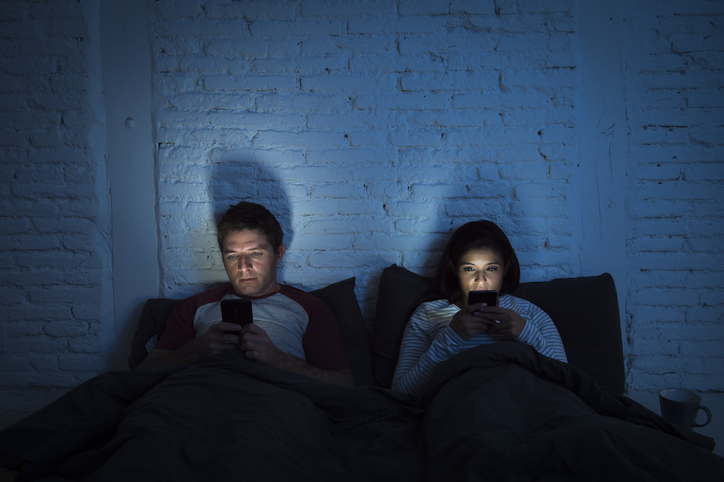In today’s fast-paced world, it seems everything is available at the touch of a button. While it’s nice to have the ability to order dinner, look up directions, see what your high school tennis coach has been up to, restock toilet paper and start your own backyard chicken coop at a moment’s notice, our constant use of technology is adding up. Case in point: The average person now spends approximately four hours a day on their phone.
For people who crave a temporary change from the connected life, digital detox retreats promise to offer all the traditional benefits of a wellness retreat — like mindfulness activities and healthy meals — but with the added bonus of being completely tech-free. Of course, you don’t need to spend an entire vacation (or paycheck) on a digital detox. There are plenty of DIY approaches to a structured tech purge that can encourage the following mental and physical health benefits.
1. You’ll sleep better.
Turning off your phone at bedtime helps you avoid distractions that keep you scrolling well into the night. Reducing your phone activity in the evenings can improve your work life. While common sense dictates that a lack of sleep will result in poor work performance the next day, studies have shown that even a 30 minute deviation from the recommended seven hours of shut eye a night can lead to lack of focus, poor productivity and low creativity.
Beyond keeping you up, using digital devices before bed increases your exposure to blue light, which has been proven to impact your circadian rhythm, making it harder to get the sleep you need to feel alert and motivated during the day.
2. You could spend less money.
Staying away from screens could have some unintended benefits for your wallet, as well. Research shows that millennials make 54% of their purchases online, and 63% complete those transactions on their smartphones. This ease of online shopping, and the aspirational nature of social media, can lead to both conscious and unconscious emotional spending, a shopping habit fueled by the often misguided notion that spending money will make you feel better. Without the ability to purchase something quickly online, emotional spenders would be forced to actually locate and drive to a store, at which point the impulse to buy may have passed.
Putting down the phone and ignoring Instagram may even help you curb spending on large, planned expenses like travel. One survey found that the “Instagrammability” of a destination is the number one motivation for millennials in the U.K. when booking a trip, beating out opportunities for sightseeing, enjoying local cuisine, and even the cost and availability of alcohol.
3. You may be happier.
Loneliness is an inherent human emotion, but some studies have found that technology may be making it more frequent. A study from San Francisco State University found that students who use their phones the most reported higher levels of anxiety, loneliness, depression and isolation. The same study also noted that the neurological response to a smartphone addiction is similar to the response found in opioid addicts. It’s important to note, however, that correlation does not equal causation – maybe you’re spending more time on your phone because you’re already feeling lonely.
Removing yourself from the constraints of technology can free up your time to connect with people on a more meaningful basis. It can also eliminate the risk of spending too much time viewing social media posts that seem to promote the exciting, carefree lives of your peers (though the truth is often much more complicated).
4. You’ll function better at work.
While it’s unlikely you can do a full digital detox at your job, studies have shown that checking your email less often throughout the day can reduce stress. Spending less time on social media while at the office can also make you more productive. According to research, 7 in 10 people use social media while at work, yet 4 in 5 people think it negatively impacts their productivity while there. Staying more focused on your work may help boost creativity and performance, potentially leading to career advancements and higher salaries.
5. Your eyes will feel better.
Staring at a screen for hours at a time isn’t just bad for your psyche, it’s bad for your eyesight, as well. People who look at computer screens for more than three hours a day may experience eye discomfort, itchy, dry or watering eyes, changes in color perception, blurred vision or difficulty focusing. If it’s not possible to spend a sustained amount of time away from your computer, experts recommend using the 20-20-20 rule to minimize potential eye damage — every 20 minutes look at something 20 feet away for at least 20 seconds — as well as taking complete breaks from your screen every two hours.
6. You’ll have better in-person relationships
The act of ignoring the people right in front of you in favor of scrolling through your phone now has a term — phubbing (or snubbing by phone) — and it could be having a negative impact on your relationships. Phubbing not only lowered overall marital satisfaction, but it also contributed to greater feelings of depression. If that’s not enough to make you put down the phone, and the University of Michigan found a correlation between social media and culture’s growing levels of narcissism. Although the research didn’t determine whether narcissism leads to increased use of social media or the other way around, making an effort to put away your phone more often can’t hurt.
It might seem next to impossible to imagine a day with less tech use, but you’ll be surprised by how quickly you can get used to the change. Once the positive effects start to kick in, taking some tech-free time might become more of a habit than a task that you have to force yourself to do.


